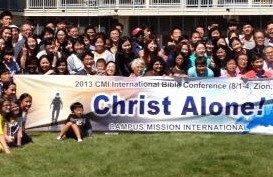Praise God Who Blessed the 2013 ISBC!
 “Praise God who blessed the 2013 International Summer Bible Conference August 1st thru 4th…”
“Praise God who blessed the 2013 International Summer Bible Conference August 1st thru 4th…”
Thus beginneth the first sentence of the official report from the 2013 International Summer Bible Conference.
Except for one tiny detail. Between the year “2013” and the word “International,” I omitted three letters.
Brian Karcher is Bitter
 Why is Brian Karcher so bitter? How could Ben and Joe forget God’s grace and start bashing UBF so shamelessly on a public website? Why can’t Chris and Vitaly stop posting inflammatory comments that build up no one and only tear down? And why are so many allowing Satan to gain a foothold in their hearts instead of doing something positive to bless the upcoming International Summer Bible Conference?
Why is Brian Karcher so bitter? How could Ben and Joe forget God’s grace and start bashing UBF so shamelessly on a public website? Why can’t Chris and Vitaly stop posting inflammatory comments that build up no one and only tear down? And why are so many allowing Satan to gain a foothold in their hearts instead of doing something positive to bless the upcoming International Summer Bible Conference?
Language is a powerful thing. It shapes the way communities think and act. Questions like these, which are being whispered in the corners at UBF chapters all over the world, are not value-free. They are so fraught with hidden assumptions and judgments that merely asking them, one is (knowingly or not) defending the status quo and deflecting attention from very serious problems that affect everyone in the UBF community.
John Armstrong on Knowing When to Stop
 As I read Brian’s last article, “It Must Come to an End,” I thought about the importance of knowing when to stop.
As I read Brian’s last article, “It Must Come to an End,” I thought about the importance of knowing when to stop.
How many organizational leaders have gotten themselves and their followers into severe trouble because they failed to see their own limitations? Because they held on to their positions of authority for so long that they lost the ability to self-reflect? Because they failed to allow the next generation to take over in a timely manner? Because they imagined that they were the rightful owners of the organization and that it couldn’t survive without them?
Then, purely by chance, I happened to watch a video of a lecture by my friend John Armstrong. It was the fifth in a series of seven lectures on Spiritual Leadership that John presented to UBF leaders in the Chicago area.
Telling it to the Church, Part 2
In the discussion following my last article, a reader who goes by the name “vmi” asked a good question.
I just want to ask Joe if you have tried the second step enough.
Have you confronted this issue with two or three more people? especially with witnesses?
I know you have already brought this before the church.
But if you haven’t done the second step, you may follow Jesus’ instruction, which is to go as a group rather than only you.
 In Matthew 18:15-17, it appears that Jesus was instructing his disciples on how to deal with interpersonal conflicts. It doesn’t give us a step-by-step guide for how to handle systemic problems in the church. Yet I believe we can generalize Jesus’ teaching to community-wide situations. For dealing with corporal sins, a reasonable implementation would be:
In Matthew 18:15-17, it appears that Jesus was instructing his disciples on how to deal with interpersonal conflicts. It doesn’t give us a step-by-step guide for how to handle systemic problems in the church. Yet I believe we can generalize Jesus’ teaching to community-wide situations. For dealing with corporal sins, a reasonable implementation would be:
- Step 1. Bring up the matters as privately and gently as possible with community leaders who are in a position to do something about them. If they do not listen, then proceed to…
- Step 2. Involve some more people (witnesses) who can back up your claims and testify that what you are saying is credible. Give the leaders hard evidence. Offer to work with them toward reasonable solutions. Do so patiently and persistently. If after repeated attempts they still do not listen, after you have exhausted all the reasonable alternatives, then proceed to…
- Step 3. Tell it to the church.
Telling it to the Church
 One of the most explicit New Testament passages on how to handle issues of sin within the church is Matthew 18:15-17:
One of the most explicit New Testament passages on how to handle issues of sin within the church is Matthew 18:15-17:
“If your brother or sister sins, go and point out their fault, just between the two of you. If they listen to you, you have won them over. But if they will not listen, take one or two others along, so that ‘every matter may be established by the testimony of two or three witnesses. If they still refuse to listen, tell it to the church; and if they refuse to listen even to the church, treat them as you would a pagan or a tax collector.”
Prayers for the Church
 I sense that the Bride of Christ needs us to pray for her now. Here are some excerpts from The Book of Common Prayer. Will you agree with me on these in the name of Jesus?
I sense that the Bride of Christ needs us to pray for her now. Here are some excerpts from The Book of Common Prayer. Will you agree with me on these in the name of Jesus?
For the Church
Gracious Father, we pray for the holy Catholic Church. Fill it with with all truth, in all truth with all peace. Where it is corrupt, purify it; where it is in error, direct it; where in any thing it is amiss, reform it. Where it is right, strengthen it.; where it is in want, provide for it; where it is divided, reunite it, for the sake of Jesus Christ your Son our Savior. Amen.
When Silence Speaks Volumes
 It’s no secret that UBFriends has become a gathering place for some who have strongly negative opinions and experiences of the UBF organization. It is a very rare and precious thing for persons and parties with strongly felt opposing positions to come together and communicate in a respectful and loving way. We (the administrators of this website) believe that God has called us to this unusual, awkward and sometimes-painful ministry of dialogue across the divide.
It’s no secret that UBFriends has become a gathering place for some who have strongly negative opinions and experiences of the UBF organization. It is a very rare and precious thing for persons and parties with strongly felt opposing positions to come together and communicate in a respectful and loving way. We (the administrators of this website) believe that God has called us to this unusual, awkward and sometimes-painful ministry of dialogue across the divide.
At times, this website has been criticized for being one-sided, unbalanced, unhelpful, overly critical, and so on. Some of that criticism is deserved. Yet from my perspective, it seems rather disingenuous for people stand at a distance, to listen to a conversation going on, to claim that the conversation is unhealthy because alternative points of view are not being represented, but then to do absolutely nothing to join in the conversation.
I understand that there are good reasons why some people feel uncomfortable discussing controversial issues on a public website. In all honesty, I believe that it would be better if these conversations that are now happening on UBFriends were taking place in another forum. But until that venue exists, I don’t see any viable alternative for those who feel that their voices haven’t been heard, except to continue to speak out with the hope and prayer that someone, somewhere will hear them and respond.
Bible Study: Is More Always Better?
 In the weeks before Samuel Lee unexpectedly passed away, the advice that he gave was, “Go back to the Bible.”
In the weeks before Samuel Lee unexpectedly passed away, the advice that he gave was, “Go back to the Bible.”
That saying, “Go back to the Bible,” features the word back. But this juncture, we have no choice but to move forward. No matter how much we pine for familiar comforts, we press on to a future that is strange and uncertain.
In this climate of postmodernity, we hear questions that a generation ago were unimaginable. In my undergraduate days, people were asking, “How can I know that Christianity is true?” The words know and true needed no explanation. But today, many are asking profound, unsettling questions about the foundations of truth and knowledge. If we cling to old ways of speaking about the Bible without understanding the ethos of the times, we risk alienating an entire generation, rendering ourselves and our message irrelevant.
Is going back to the Bible an appropriate direction for today? That depends on the context.
On the Ministry of Reconciliation
 Yesterday, a friend called my attention to an article titled, An Open Letter to the Church: How to Love the Cynics. The author, Addie Zierman, writes from the standpoint of those who have left their evangelical churches.
Yesterday, a friend called my attention to an article titled, An Open Letter to the Church: How to Love the Cynics. The author, Addie Zierman, writes from the standpoint of those who have left their evangelical churches.
The article begins very abruptly:
You should know, first of all, that there’s no quick-fix here. There are not ten steps. There is no program that you can implement, no “Young Adult” class you can start.
This is not about your building or your music or your PowerPoint slides.
There is not a trendy foyer in the world with the power to bring us wandering back.
After all, there’s not much you can say to us that we haven’t already learned in some Sunday School classroom somewhere. We know the Bible stories. We heard them over and over, year after year until they became part of our blood, part of our bones.
What Are Friends For?
 “As iron sharpens iron, so one person sharpens another” (Pr 27:17).
“As iron sharpens iron, so one person sharpens another” (Pr 27:17).
At a recent breakfast with a group of Christian men, one person offered this verse as an illustration of how believers ought to have fellowship with one another. Real friendship, he suggested, is not merely for relaxing and enjoying one another’s company; it is also for holding one another accountable and telling one another the hard truths that we all need to hear.
Accountability is certainly needed. And who can dispute the importance of telling anyone the hard truths that they need to hear?

Last 30 Comments